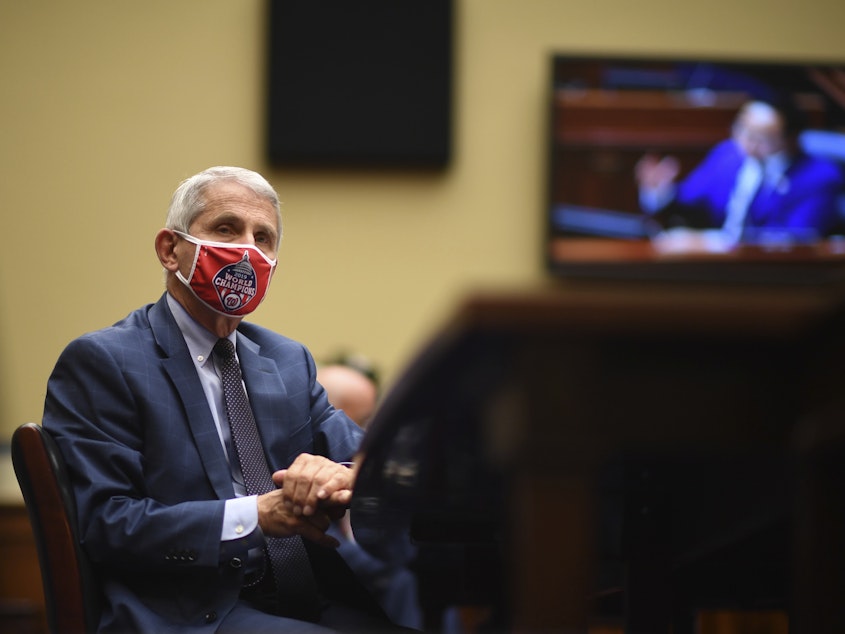Fauci 'Optimistic' Americans Will Get Coronavirus Vaccine Next Year

A coronavirus vaccine could be ready for distribution by the end of the year, and distributed to Americans in 2021, the nation's top infectious disease specialist told lawmakers Friday.
Updated at 4:15 p.m. ET
While it typically takes years to develop vaccines, new technologies, the lack of bureaucratic red tape, and the human body's robust immune response to COVID-19 have hastened the process, Dr. Anthony Fauci said.
"From everything we've seen now — in the animal data, as well as the human data — we feel cautiously optimistic that we will have a vaccine by the end of this year and as we go into 2021," said Fauci, director of the National Institute of Allergy and Infectious Diseases. "I don't think it's dreaming."
In contrast to the decades-long search for an HIV vaccine, COVID-19 is more likely to respond to a vaccine, Fauci said. HIV vaccine development has been so difficult because the body doesn't make a strong immune response to that virus, he explained. With COVID-19, the immune response is much stronger.
Sponsored
Over 250,000 people have already registered their interest in participating in clinical trials, Fauci said. He urged Americans to sign up at CoronavirusPreventionNetwork.org, "so that you can be part of the solution of this terrible scourge."
The administration is preparing for wide distribution, with the hope that the current vaccine candidate will prove effective in Phase 3 trials, Fauci said. Fauci said the administration is taking "financial risk" to prepare for distribution once the vaccine is shown to be safe and effective.
The Department of Defense and Centers for Disease Control and Prevention would work together to distribute a vaccine to Americans in phases. Government committees will determine who needs the vaccine first, Fauci said. That will likely include essential workers and people at greater risk.
The Food and Drug Administration would still need to grant final approval before any vaccine is administered to the public.
Lawmakers at the hearing drew attention to issues of importance to them and their supporters. Rep. Jim Jordan, R-Ohio, was especially concerned about state edicts limiting attendance at religious gatherings, without also putting similar restrictions on political protests.
Sponsored
"Do protests increase the spread of the virus?" Jordan asked Fauci.
"Crowding together, particularly when you're not limiting the mask, contributes to the spread of the virus," Fauci responded.
"Should we limit the protesting?" Jordan pressed.
"I'm not sure what you mean," Fauci said.
"Should government limit the protesting?"
Sponsored
"I don't think that's relevant," Fauci said, adding: "I'm not in a position to determine what the government can do in a forceful way."
"Well, you make all kinds of recommendations. You've made comments on dating, on baseball, on everything you can imagine," Jordan said.
The back and forth lasted for several minutes, as Fauci repeatedly declined to discuss which specific activities should be limited. "I'm not going to opine on limiting anything, I'm telling you what ... is the danger. And you can make your own conclusion about that. You should stay away from crowds no matter where the crowds are."
"Any crowd in which you have people close together without masks is a risk," Fauci said later, in response to accusations by Jordan that Fauci had changed his position several times on many things. "And I'll stick by that statement. It's a public health statement. It's not a judgment on why you're there in the crowd; it's a judgment related to the fact that you're in the crowd."
Democratic lawmakers defended the protests. "I'm sitting here as the result of a protest," said Rep. James Clyburn, D-S.C., who was chairing the hearing.
Sponsored
He met John Lewis, the late Georgia congressman, years ago while protesting, Clyburn said. "Trying to get off the back of the bus. Trying to integrate schools. Trying to be able to shop in a 5- and 10-cent store and not be arrested for trespassing."
"I'm glad the government did not limit our protests," Clyburn said, adding that the protesters on the Black Lives Matter Plaza in Washington, D.C., were peaceful.
Republican lawmakers expressed a desire to get students back in school as soon as possible. It's not just about education, said ranking Republican Steve Scalise of Louisiana. Schools perform several other important functions, he said, including detecting thousands of cases of child abuse every year.
CDC Director Robert Redfield said he agrees that getting K-12 students back to school for face-to-face learning is in the public health interest. In-person school attendance helps children's mental health, contributes to good nutrition, and lets counselors detect child abuse, he said.
"As a grandfather of 11 grandkids, I want these kids back in school," Redfield said.
Sponsored
There was also a question from Missouri Republican Blaine Luetkemeyer on the widely discredited theory that hydroxychlorquine is an effective treatment of COVID-19.
A Henry Ford Health System study finding it effective was flawed, Fauci said, calling it "a non-controlled, retrospective cohort study that was confounded by a number of issues." No randomized, placebo-controlled study has shown the efficacy of hydroxychloroquine. [Copyright 2020 NPR]

